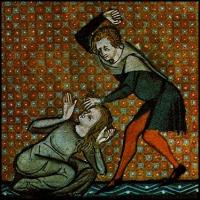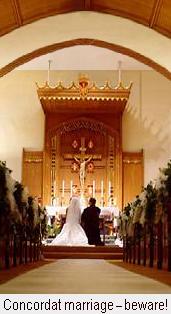Scratch
In a separate development the Pope issued a decree in December 2009 which could serve to tighten up concordat marriage by eliminating a loophole used by those who had left the Church in order to get a civil divorce. This had freed Catholics who had “formally defected” from the Church from its regulations, that is, from Canon Law. “This [meant] that a defecting Catholic could validly be married in a civil ceremony, for example, without a dispensation.” Now, however, that clause, and with it, the possibility of formal “defection” from the faith has been eliminated: “All Catholics are bound by canonical form in marrying, period.” Including those who consider themselves ex-Catholics. Countries whose marriage laws closely mirror Canon Law could now be under pressure to conform to this decree and prevent even ex-Catholics from ever getting a divorce.

-----------------------
“acta de canje” and “atto di scambio” are identical and Martin de Agar switches between Spanish and Italian seemingly without realising. This term seems usually to refer to the exchange of instruments of ratification.
“How many thousands of Masses for the Dead or other special occasions are said at about $100 apiece over the course of a priest’s lifetime? How can the average archdiocese afford to pay for a priest’s education, only to be forced to let him go if accusations of pedophilia are brought against him?” — Jeannie Cole
----------
Backpedalling on Vatican II: once again, religious freedom is not a "right"
p. 242 "The Catholic Church has always taught that in a state in which different religions coexist, it's necessary to exercise tolerance in order to preserve public peace and thus permit the peaceful practice of the Catholic religion. This tolerance only implies that in fact the false religions are allowed to practice their worship under limited conditions -- for error having no right, one cannot grant false religions an unlimited [right to] practice. The doctrine of religious liberty is different, for it considers that there is not only tolerance, but a right inherent in human nature to not be constrained in terms of religion, whether this is objectively truth or error."
p. 268
Monseignieur Bernard Fellay, Prelate of the Fraternity of Saint Pius X (Fraternitas Sacerdotalis Sancti Pii X) considered that "it's not the Holy Ghost that inspired the Council [Vatican II] but the Devil" [Conference given at Brussels by Monseignieur Bernard Fellay, Superior General of the Fraternity of Saint Pius X, 20 June 1998.]
http://www.jeuneafrique.com/jeune_afrique/article_jeune_afrique.asp?art_cle=LIN08106ouveriinaci0
p. 270
The new pope is doubtless in the best position to allow a full and complete reconciliation between Rome and the traditionalists at the expense of Vatican II. But will this reconciliation go as far as to open the way to return the Church to the way it was before the Council? Not officially. No pope, least of all this one, wants to risk giving credence to the idea that the Church made an error of judgement. Rome's obsession is to find a way to roll back the advances of Vatican II without harming the myth of "papal infallibility". Two discursive strategies developed in parallell by Cardinal Ratzinger and the members of the SSPX address this issue.
The first consists in explaining that the ultramodern interpretaation of Vatican II is not due to the Council itself, but to an improper interpretation called the "spirit of the Council". This argument was developed by Ratzinger in 1985 in The Ratzinger Report: An exclusive interview on the state of the Church. http://www.amazon.com/Ratzinger-Report-Exclusive-Interview-Church/dp/0898700809/ref=sr_1_29?ie=UTF8&s=books&qid=1223824197&sr=1-29
In veiled langauge, he there proposes a plan for a "restoration", allowing a limitation of the modernist influence of the spirit of the Council while still remaining faithful to it: returning to the "true Council", beyond the "spirit of the Council".
The other discursive strategy consists in reducing the scope f the Council, by truning it from a doctrinal statue -- which involves papal infallibility -- into a simple "pastoral" statute which is fallible and therefore can be modified. This is a point on wich both the new pope and the traditionalists would be able to agree. The abbot, Gregoire Celier recalls that in 1988 Cardinal Ratzinger already seemed to be leaning towards this interpretatation : "The truth is that the Council itself has not defined any doctrine and confined itself to a more modest level, simply as a pastoral council."
p. 276
In other words, the future pope insists on distinguishing tolerance of other religions for the sake of peaceful coexistence, from an ecumenical approach leading to relativise the truth of Catholic dogma.
------------------------------------------------------------------------------------------
EU lawyers warn:
Concordats endanger human rights
 Concordats help enforce Canon Law, the Vatican version of Sharia
Concordats help enforce Canon Law, the Vatican version of Sharia
Under Canon Law wife beating is no ground for divorce — in fact, nothing is. Therefore if you've been married in a Catholic Church, which means under Canon Law, you may find that a concordat has deprived you of your right to a civil divorce. The Dominican concordat (1954, Article 15.2) says explicitly that people married in a Catholic church, and therefore under Canon Law, may never file for a divorce. So, too, did the Portuguese concordat concluded with Salazar (1940, Article 24). At least in those countries divorce remained legal, even if one had to leave the Church to get one. However, divorce was impossible under both the Italian concordat with Mussolini (1929, Art. 34) and the Spanish one with Franco, (1953, Art. 23-25). Until recently it was impossible in Malta, and the 1993 Marriage Concordat was meant to ensure that it remained so.
 Other concordat clauses enforce Canon Law on the employees of Church-run institutions, even though these are funded by the state. For example, the concordat with Hitler (1933, Article 24) is used to this day to fire teachers in Catholic schools if they remarry after a civil divorce or even if they marry a divorced person.
Other concordat clauses enforce Canon Law on the employees of Church-run institutions, even though these are funded by the state. For example, the concordat with Hitler (1933, Article 24) is used to this day to fire teachers in Catholic schools if they remarry after a civil divorce or even if they marry a divorced person.
And the social influence of concordats doesn't end with the intimidation of Church employees. Through employees in Church-run hospitals, concordats can be used to enforce Canon Law on the general public. The Slovak “conscience concordat” would have prevented doctors in Church-run hospitals from performing abortions or nurses from giving out information about family planning, since it gave them the “right” to claim that this went against their religious conscience. And, of course, if they didn't exercise this “right” to impose Canon Law on others, they'd lose their jobs. In a rural area where the only hospital may be Church-run, this can effectively limit access to what are in Slovakia perfectly legal services.
At this point legal experts appointed by the European Union put their foot down. They stated firmly that denying access to such services, Canon Law or no Canon Law, was a violation of international Human Rights. Read more...






